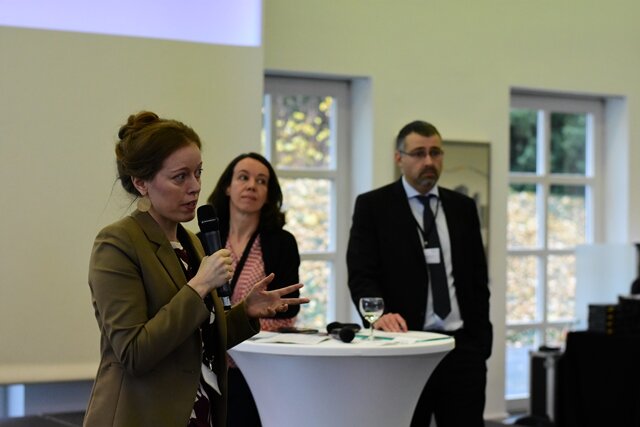Press releases
New publication \ “Stabilisation—For Whom and to What Ends?”
On 20 November 2018, BICC hosted an international academic conference entitled “Stabilisation—For Whom and to What Ends?” in Bonn. The recent BICC Knowledge Note 1\2019, edited by Esther Meininghaus, Katja Mielke and Max Mutschler, documents the conference’s outcomes.

‘Stabilisation’ is becoming increasingly important as a policy paradigm in international security and development policy. However, different approaches to stabilisation are discussed in academia, policy and practice. Often, there is a tension between short-term approaches to stabilisation that are dominated by concerns for security and the establishment or maintenance of order, and more long-term perspectives which seek to transform the underlying structures, e.g. with regard to democracy, peace and human rights. BICC Knowledge Note “Stabilisation—For Whom and to What Ends?” reflects the lively and engaged exchange of participants during the international conference in Bonn.
The leading questions of the conference, introduced by Esther Meininghaus, Katja Mielke and Max Mutschler, formed the basis for the discussions of the day: a) What is our understanding of stabilisation? b) How does stabilisation work in practice? c) Does the growing significance of stabilisation imply abandoning support for democracy and human rights, focusing instead on the establishment and maintenance of order? In three parallel topical groups, the participants shared their views on three core themes related to stabilisation: “Peacekeeping and Military Intervention”, “Train and Equip Programmes and Security Sector Reform” and “Migration Management and Humanitarian and Development Aid”. Three parallel discussion groups on Iraq, Syria and Mali also followed these questions. Additionally, the participants were invited to discuss the results of these breakout groups in a ‘market place’ and in plenary sessions.
The conference was generously funded by the Deutsche Stiftung Friedensforschung (DSF, German Foundation for Peace Research) and the Foundation for International Dialogue of the Savings Bank in Bonn.
Press release “Neue Publikation \ “Stabilisation—For Whom and to What Ends?” (pdf, in German language)
The leading questions of the conference, introduced by Esther Meininghaus, Katja Mielke and Max Mutschler, formed the basis for the discussions of the day: a) What is our understanding of stabilisation? b) How does stabilisation work in practice? c) Does the growing significance of stabilisation imply abandoning support for democracy and human rights, focusing instead on the establishment and maintenance of order? In three parallel topical groups, the participants shared their views on three core themes related to stabilisation: “Peacekeeping and Military Intervention”, “Train and Equip Programmes and Security Sector Reform” and “Migration Management and Humanitarian and Development Aid”. Three parallel discussion groups on Iraq, Syria and Mali also followed these questions. Additionally, the participants were invited to discuss the results of these breakout groups in a ‘market place’ and in plenary sessions.
The conference was generously funded by the Deutsche Stiftung Friedensforschung (DSF, German Foundation for Peace Research) and the Foundation for International Dialogue of the Savings Bank in Bonn.
Press release “Neue Publikation \ “Stabilisation—For Whom and to What Ends?” (pdf, in German language)


